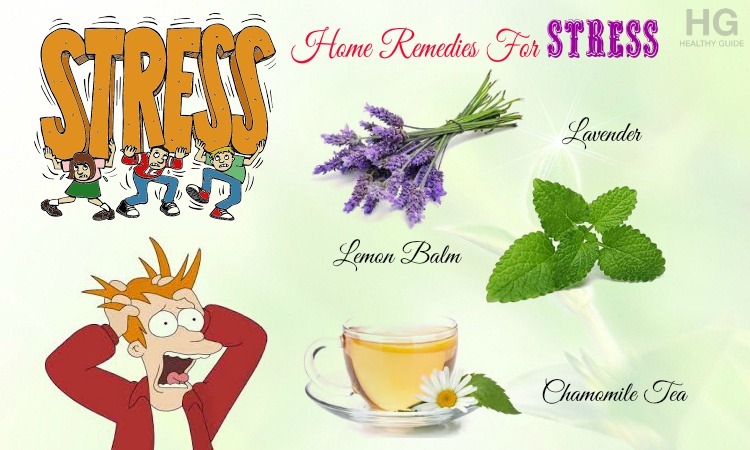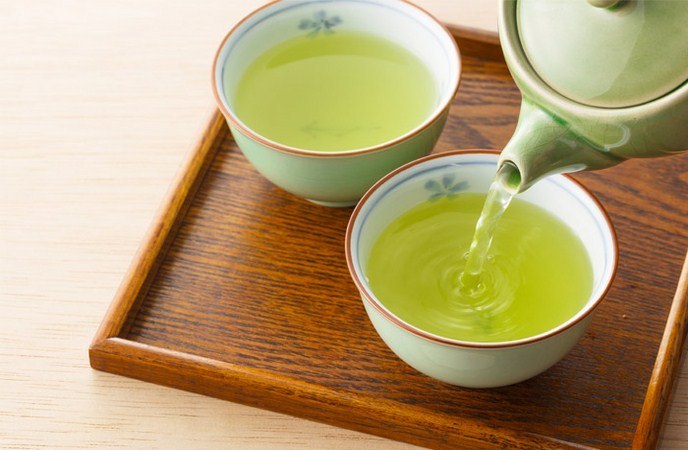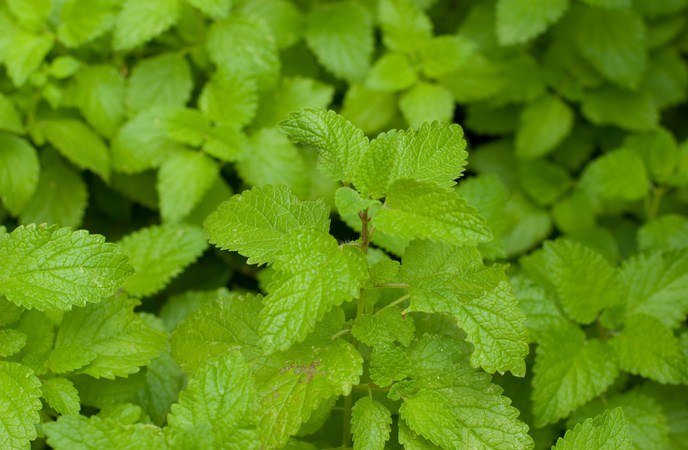Stress is common in this modern society where people are always busy with work, family and relationships. Stress is not always bad. If it exists in small doses, then it could help you perfect under the acceptable pressure and motivate your to try hard at your best. However, if you are constantly suffering from stress, running in emergency mode, then your body and mind will pay the price. Before introducing to your home remedies for stress relief, we from Healthy Guide will help you understand some basics about stress.
Home Remedies For Stress – What Is Stress?
In essence, stress is a way of the human body to respond to any type of threat and demand. When a person senses danger; whether it is imagined or real, his body’s defenses will kick into high gear in automatic, rapid process which is known as “fight-or-flight” reaction – the stress response.
This is the body’s way of protecting us. When working appropriately, it will help us stay focus, alert and energetic. In those emergency situations, stress could save our lives by giving us more strength to defend ourselves.
However, beyond a certain level, stress will cause damage to your overall health, your productivity, your mood, your relationships and your well-being.
Home Remedies For Stress – Common Effects Of Chronic Stress
The human nervous system is not good at distinguishing between the physical and emotional threats. If you are extremely stressed over a discussion or argument with your friend, a ton of bills, a deadline of work, your own body could react as strongly as if you are coping with a life-threatening situation. The more your emergency stress system is naturally activated, the harder it is to disappear. Some health issues caused or triggered by stress include:
– Sleep problems
– Anxiety and depression
– Pain
– Digestive problems
– Autoimmune diseases
– Skin conditions like eczema
– Weight problems
– Heart disease
– Reproductive issues
– Memory and thinking problems
Home Remedies For Stress – Signs And Symptoms Of Stress Overload
It is worth noting that stress is very easy to creep up on you. You will become familiar with it. Perhaps, you do not notice how much it is impacting you, even when it takes a big toll. So, it is important to be aware of signs and symptoms of stress overload:
– Poor judgment
– Memory problems
– Difficult in concentrating
– Seeing on just negative sides
– Racing or anxious thoughts
– Constant worrying
– Moodiness, anger or irritability
– Emotional and mental health problems
– Isolation and loneliness
– Diarrhea and constipation
– Chest pain
– Sex drive loss
– Quick heart rate
– Eating less or more
– Sleeping too little or too much
– Using cigarettes, drugs, or alcohol to relax
– Nervous habits like nail biting
– Reduce work productivity or efficiency
– Mumbled or rapid speech
– Problems in sharing and communication
– Frequent use of OTC drugs
Home Remedies For Stress – Common Causes Of Stress
When it comes to stress, the pressures and situations causing stress are called stressors. We often think that stressors are negative, like rocky relationship, financial problems, or exhausting work, but actually anything putting high demands on us could be stressful, be it getting married, going to university, buying a new house, or getting a promotion.
Sometimes, stress could be caused by internal factors which could be self-generated. What causes stress often depends on the subject’s perception of it.
These are top stressful life events that many people report:
– Divorce
– Death of a spouse
– Illness or injury
– Marriage
– Loss of job
– Marriage reconciliation
– Marriage separation
– Imprisonment
– Retirement
Due to the widespread of effects of stress on affected people, it is crucial to acknowledge your personal limit. However, how much stress is “too much” may differ from person to person. When coping with stress, the things influencing your level of stress tolerance are often your network of supporting, sense of control, outlook and attitude, ability to handle emotions, preparation and knowledge.
However, before finding out home remedies for stress, you should identify the sources of your stress. Stress management begins with identifying the root causes of stress in your life. This is not as clear as it sounds. Whilst it is easy to recognize the main stressors like moving, changing jobs, getting divorced, pinpointing the real sources of chronic stress could be more complicated. It is too easy to skip how your own feelings, thoughts and behaviors contribute to your daily stress levels. Of course, you might know that you are constantly worried about the work deadlines, but perhaps it is just your procrastination, instead of the real job demands, which is causing your stress.
In order to identify your true stress, you should look closely at your attitude, habits, and excuses. Until you can accept the responsibility of yourself in creating and maintaining stress, the stress will still be out of your control.
48 Easy But Effective Home Remedies For Stress Relief
1. Epsom Salt
When it comes to home remedies for stress, Epsom salt is a great ingredient which is useful and effective in calming you down when you have stress. Basically, stress will lead to low magnesium levels within the body and boost the adrenaline levels. Thus, using Epsom salt which is rich in magnesium will increase the mood-boosting serotonin chemical within your brain. In turn, this helps reduce stress levels, promote relaxation and relieve irritability, anxiety, abnormal heart rates and insomnia. What you have to do to relieve stress using Epsom salt is:
– Take a cup of Epsom salt and several drops of your chosen aromatic essential oil to add into the warm bathwater
– After stirring them thoroughly, you soak yourself in this solution for 20 minutes
– Enjoy this solution twice or thrice per week
2. Chamomile Tea
This is an effective herb among many home remedies for stress relief. Thanks to its soothing and calming nature, chamomile tea could positively impact the central nervous system, helping relax muscles and ease anxiety while still promoting better sleep.
– Drink no more than 4 cups of chamomile tea per day to help defeat stress. The tea can be made by adding 2 teaspoons of dried chamomile into a cup of the hot water. After covering and steeping it for about 10 minutes, you strain it up and add raw honey into. Drink it and see how different chamomile tea your mood is after that.
– As an alternative, you can mix fresh chamomile flowers with several drops of chamomile essential oil and add them to the warm bathwater for a relaxing soak.
– Also, you could take advantage of this herb in the supplement form. However, get the advice from your doctor for proper dosage.
Learn more: How To Use Essential Oils For Headaches – 15 Great Oils To Apply
3. Ashwagandha
Other solution for those who are looking for best home remedies for stress relief is ashwagandha, which is also known as Indian ginseng. Being an effective herb for stress, it can reduce stress and anxiety by lowering the levels of cortisol which is a stress hormone. Also, it improves the resistance to anxiety and stress, helping improve the life quality.
Additionally, according to a study published in India in 2012, it was found that ashwagandha root is very good at strengthening the human nervous system, boosting energy and fighting tiredness and fatigue while improving the quality of sleep.
This herb is available in the market in different forms, dried root, fresh root, powdered form or supplement form. It is recommended to take the dose of 1-2 grams of the dried or fresh root boiled in 1 cup of water or milk, drink it thrice per day. If you choose to take supplement form, you should consult a doctor first.
Warning: Children and pregnant women should not take this herb.
Read more: How To Get Rid Of Clogged Ears Naturally At Home – 27 Tips
4. Holy Basil
Another great Ayurvedic herb which works as a good natural anti-stress agent is Holy basil. Holy basil, an adaptogenic herb can enhance the natural response of the human body to both physical and emotional stress. Moreover, it can help the human body function appropriately during stress.
It is proven that holy basil can protect against chronic restraint stress-induced stress, via its effect.
– You just need to chew from 10 to 12 fresh holy basil leaves 2 times per day
– Or, drink a cup of basil tea to decrease stress. In order to make this tea, you should put 1 tablespoon of the fresh leaves of basil in a cup of boiling water. Then, cover and let it steep for 5 minutes before straining it up. Sip the tea steadily.
Learn more: Top 34 Tips On How To Improve Skin Naturally With Oils
5. Green Tea
Green tea, one of commonly used home remedies for stress, has L-theanine, which is an amino acid promoting the alpha brain waves, thereby reducing stress, encouraging relaxation and improving mental alertness and focus.
Furthermore, it also contributes the development of gamma-aminobutyric acid (GABA), which is a neurotransmitter promoting relaxation. Take the following steps:
– Take 2 teaspoons of green tea leaves to add into 1 cup of hot water
– Cover the cup and let it steep for 5 minutes before straining it up
– If you want, add fresh lemon juice plus with organic honey into the solution
– Drink it twice or thrice per day to eliminate stress
Learn More: Top 21 Best Home Remedies For Fungal Nail Infection
6. Passionflower
One of effective home remedies for stress is passionflower. This herb could increase the levels of GABA within your brain, helping reduce the stress as well as anxiety along with panic attacks.
– Drink 1 cup of passionflower tea which is made from 1 tablespoon of dried herb added in 1 cup of hot water. After being steeped for 10 minutes, you can drink the tea when it is still warm.
– Passionflower is available in the form of liquid extract, tablet and tincture. You should consult your doctor before using any supplement because it might interact with some specific medications.
Warning: Small children and pregnant women should not take this herb.
7. Hops
In hops, there is a sedative compound – volatile oil which can be gotten in tinctures and extracts. Because they are bitter, so you may not see it in tea form, if it is not combined with mint or chamomile. Hops are usually used as a natural sedative, helping in improving sleep, often with valerian. But, you should not take sedative herbs when taking a prescription sedative or tranquilizer. Consult your doctor before taking any supplements.
8. Valerian
Some supplements made from herbs can decrease anxiety without inducing sleepiness. But, valerian is not such supplements. It is a considered as a sleep aid, particularly for insomnia. Containing sedative compounds, this herb is approved to be a treatment for those with sleep problems.
The smell of valerian is rather nasty, so it is often taken in the tincture or capsule form, instead of tea. If you would like to try out it, then it is advised to take it in the evening, not before heading to your office. The herb is usually combined with some other sedative herbs like chamomile, hops or lemon balm.
9. Lemon Balm
Lemon balm has been commonly used at least since the Middle Ages in order to help reduce anxiety and stress, and promote sleep. According to a study of some healthy volunteers, people taking standardized lemon balm extracts (about 600mg) were more alert and calm than those who did not.
Whilst it is rather safe, be careful that if taken too much, it could make you much more anxious. Thus, follow strictly the instructions and begin with small dose. Sold as a tea, tincture and capsule, lemon balm is usually combined with other calming herbs like chamomile, hops or valerian.
10. B Vitamins
To find the best home remedies for stress relief, it is helpful to try out as many options as possible. One of the suggested ways to relieve stress that many people reported good results is taking B vitamins. The eight B vitamins, from B1 to B12, can boost the proper function of brain as well as nervous system, and induce relaxation while fighting fatigue and stress.
The deficiency of B vitamins within the human body could lead to depression, apathy, and irritability. Therefore, when you are stressed, consume more B vitamin- rich foods.
– Foods which are rich in B vitamins are whole grains, peanuts, beans, peas, spinach, blackstrap molasses, kale, bananas, potatoes, avocados, eggs, legumes and dairy products.
– Also, you could take these vitamins in supplement form. Consult your doctor before the kind of B vitamins that you own body needs.
11. Lavender
It is proven that lavender’s aroma may have emotional anti-inflammatory properties which make us feel less anxious.
12. Eat Something Quick
Oftentimes, people get anxious and irritable when they get hungry. When an anxiety attack rises, it might mean that your blood sugar is reducing. That case, you should take a quick sustaining snack, such as walnuts, dark chocolate, plus with a glass of water or a cup of hot tea.
13. The 21-Minute Cure
You may wonder what 21-minute cure means when it comes to home remedies for stress relief, right? Actually, it is about how long it takes for common exercises to reliably decrease anxiety. If you get anxious and hop on the treadmill, you will become calmer after the workout.
That is why most exercises are planned during 20-30 minutes because that amount of time will get the heart rate up, whether it is stair stepping, a treadmill or elliptical, or something you like. But, if you are not ready to exercise, simply take brisk walks to alleviate stress symptoms.
14. Blueberries
According to a study, diet is the key to control stress in the long term. Blueberries with their high content of antioxidants are very powerful in reducing stress. Thanks to a lot of minerals such as magnesium and manganese, vitamin C and vitamin E, they could combat sleeplessness, depression and other mood problems if consumed every day.
15. Spinach
Having a large amount of healthy nutrients, like vitamin A, B-vitamins, and vitamin C, magnesium, calcium, potassium and phosphorus, spinach can minimize the magnitude of stress-triggering hormones while normalizing the frame of our mind. Just simply taking a cup of boiled spinach each day could bestow calming and soothing effects to your body and supply required potential to your body to defeat stress and pressure.
16. Salmon
Many studies have proven that fishes are considered the richest natural source of omega-3 fatty acids. Salmon is one of them. Omega-3 fatty acids can fuel the human brain with serotonin – the happy chemical – which is good in managing stress hormones.
On the other hand, this type of cold water fish has anti-inflammatory compounds. Thus, experts recommend taking omega-3 fatty acids from food whenever possible. Other good choices alternating for salmon are sardines, anchovies, and mussels.
17. Almond
Almond is very familiar with us, but not many of us know that it is good for stress relief. Among home remedies for stress relief, almond not only helps in control stress symptoms but also furnish your own body with fibers. It is also rich in vitamin B and E, magnesium, zinc, and healthy oils.
18. Brown Rice
Nowadays, a large number of people prefer to consume brown rice because their abundance of B vitamins, which is beneficial in maintaining cells, tissues, and other vital organs in our bodies. Furthermore, as mentioned earlier, B-vitamins also support the well-being of the brain strength, cardiac function, red blood cell health, and body resistance. If you consume a large amount of B-vitamins, it also assists your body and mind in having less strain and pressure.
19. Oatmeal
Oatmeal is one of natural and safe home remedies for stress relief because it is jam packed with dietary fiber which can help the human body absorbs the oat a slow pace, thereby extending the increase of serotonin – a happiness-boosting hormone. Oat even supports the control of fluctuating sugar level.
20. Yogurt
Yogurt, one of dairy products, is rich in calcium. Calcium is good for both teeth and bones, not mention to keeping petulance aside. For those women with PMS trouble, yogurt also helps a lot. Similar dairy products offering the same benefits are cottage cheese and milk.
21. Whole Grain Bread
Another one in this list of home remedies for stress is whole grain bread which when being combined with honey or jam can prove you with a stress-relieving snack. Being a complex carbohydrate-rich food which elevates serotonin level, whole grain bread can relax and calm you down.
22. Soup
One of great but little-known home remedies for stress is soups. This stress-relieving food is nutritious and easy to digest. The vegetables in this soup even make it healthier.
23. Desserts
A pastry, ice cream, pie or cake or any dessert could reduce the intensity of anxiety-producing hormones such as Glucocorticoid from having dangerous effect on the human brain, helping decreasing fretfulness and irritation.
24. Asparagus
Asparagus offers folic acid and stimulates the happy chemical named “Serotonin” to release, which helps people keep their mind mollified.
25. Coffee
If you are looking for easy-to-find home remedies for stress relief, then coffee is exactly your answer. Sipping a hot cup of coffee can help you lessen the mood in just several minutes. Nonetheless, caffeinated beverages are not reckoned as good options for health, but if consumed in proper amount, it brings positive effects to your overall health. In fact, over-indulgence of anything is always not good. Besides, it is found that people drinking coffee twice per day seem to get less depressed.
26. Walnut
Just a handful of walnut in a day can regulate the sporadic blood pressure troubles and keep your anxiety and fretfulness under control. You can use peanuts as an alternative.
27. Avocado
This is an abundant source of essential nutrients, such as minerals, protein, fiber, vitamin C and E, healthy fat, and potassium. Those nutrients can keep the human brain cells moving and healthy. Also, this fruit is potent enough to reduce high blood pressure.
28. Exercise
To be honest, exercise is a great solution for stress, but it should be moderate-intensity, aerobic or high-intensity exercise. It can decrease the stress hormones and boost feel-good hormones within your body. Furthermore, it also improves the mood as well as distracts you from worries and anxiety.
You could just dance, swim, play sports or even take a short walk. Or, practicing yoga can also help you fight off stress. Yoga, in reality, works as a good meditation, helping calm both your body and mind. Also, it improves your concentration and assists you in remaining clear and calm in everything you do. Yoga is widely used for stress reduction. It might help reduce stress hormone levels as well as blood pressure.
29. Deep Breathing
Slow and deep breathing could help you control stress. Deep breathing will make more oxygen enter your body, giving calming effects on your body and mind. It is estimated that 15 to 30 minutes of deep breathing can help prevent stress effectively.
Tips to perform deep breathing the right way:
– Sit or lie down in a comfortable, quiet place when you get stress
– Close the eyes, take a deep and slow breath via your nose to the count of 5
– Keep the breath for about 5 counts before exhaling for another 5 counts.
– Repeat this routine 5-6 times till you feel relaxed and calm down.
30. Massage
If you want to relieve stress while still improving your overall health, particularly mental health, then go for massage. According to experts in traditional Chinese medicine, massage can help open the blocked energy channels to decrease stress and boost overall health. The application of oil to the whole body at regular intervals can make the strain and stress wash out of your own system. For better results, you can mix a small amount of shankhpushpi or brahmi powder with your chosen oil for massage.
Just take advantage of warm oil massage of your hands, feet, back and head to improve circulation, fight anxiety and relax tense muscles.
Steps to prepare for a relaxing massage:
– Warm up your favorite oil
– Use warm oil to massage gently your forehead, shoulders, neck, back as well as bottom of the feet.
– Take a warm bath after that
– Repeat this routine daily to decrease stress
31. Stop Catastrophizing
When a person is attacked by stress and anxiety, it is very easy to sink in a mindset called as “catastrophic thinking” or “catastrophizing”. Rather than, taking a few deep and slow breaths, wander around your block will help you get rid the inducement of falling into catastrophizing.
32. Get Hot
Have you ever wondered why you feel very great and relaxed after steaming? Heating up the body will reduce anxiety and muscle tensions, according to many researches. The sensations of warmth might change neural circuits controlling mood, including the ones affecting neurotransmitter serotonin.
Actually, warming up is also considered as a way of exercising, which is proven to help boost mood. Grabbing several minutes in the spa or sauna after a hard working day, or sitting in a hot bath in the evening can give you a sense of relaxation as well as well-being.
33. Take Forest Bath
This sounds rather strange, but literally, forest bath means that you walk in the forest of woods. According to Japanese researchers, the stress hormone levels decreased in those people who walk in a beautiful forest with the sounds of running stream and woodsy smells. The same goes for those who walk in an urban area.
34. Practice Mindfulness Meditation
Also known as a mainstream therapy, mindfulness meditation is very effective in reducing anxiety. The practice of mindful awareness can help people experience the true essence of every moment as it truly happens, instead of what is feared, thought or expected.
How to start? Well, very simple. You could begin with “paying close attention to the current moment” with curiosity and non-judgment.
35. Breathe And Question
In order to stay mindful and relieve stress, you should ask yourself some questions whilst practicing some simple breathing exercises. What you need to do is:
– Sit in a relaxing, comfortable place with eyes closed
– Try to concentrate on how your breath feels when coming in and out of the body.
– Then, ask yourself some questions from within while still focusing on your breath.
Now, answer the following questions:
– How does the breath feel different when it leaves your own body?
– What is the air’s temperature when entering your nose?
– How does the air feel as it fills up your lungs?
36. Modify The Self-Talks In Your Head
Most people have silent dialogues with themselves daily and such self-talks can affect significant to our mood, particularly tension-triggering, negative ones. They paint us with a dark picture and offer us no good choices. More rational, positive self-talk, on the other hand, can inspire a lot. Irrational self-talks might be a long-term habit with you, so you should modify them little by little at a time. Consult a professional therapist if you need some help.
37. Laugh
Laugh is a helpful way to reduce stress and improve mood. Humor can keep problems in proper perspective. The action of laughing leads to chemical changes within our body which elevates our sense of well-being. If you need some help when being depressed, watch an interesting television program or funny movie, or share enjoyable memories with old friends, or go to the cinema.
38. Organize Your Own Life
This sounds rather strange when it comes to home remedies for stress. But, believe me, if you do it, you will surprise at how different your mood is after that. Organization gives a sense of control as well as a peace of mind. In regard to this issue, there are a lot of ways you can do. If you always run around, then it can make you remember everything. Besides, if you always feel edgy in your own house, this act will help you be tidy up.
39. Limit The Use Of Internet And Cellphone
Yes, we are saying: disconnect. Overuse internet and cellphone is a problem that causes stress and depression. Therefore, by cutting off Internet and cellphones, we could block some channels which may stress us. Also, doing it can let us live in the real moment and appreciate it.
It is important to stop using such devices before going to sleep, which can also reduce insomnia-related issues.
40. Sleep
Yes, this is a simple but effective option in regard to home remedies for stress. In reality, too much sleep can leave us depressed and sluggish while too little sleep leaves us irritable, cranky and on edge. That is why having a right amount of sleep can let us feel well-rested and actively ready for the whole day. Establish bedtime rituals to promote good sleep. Also, before going to sleep, take a warm bath. Apply a healthy diet can also contribute to improve your sleep quality. Certain foods could improve sleep like bananas, carbohydrates, peanuts, figs, turkey and dairy. Those foods contain the trytophans, which is a precursor for producing melatonin. Nonetheless, you should avoid consume a large meal before hitting the hay as it might lead to reflux, heartburn or indigestion.
41. Decompress
In this list of home remedies for stress, decompress seems very simple. What you need to do is to place a warm heat wrap around your shoulders and neck for about 10 minutes. Then, close the eyes, relax your facial muscles, upper chest along with back muscles. After that, remove the wrap and make use of a tennis ball to throw away tension. Simply place the ball between the wall and your back. Then, lean into the ball and keep for gentle pressure for 15 seconds. Then, you move that ball to another spot, apply pressure.
42. Listen To Music
According to researches, listening to soothing music can help decrease blood pressure; reduce heart rate as well as anxiety. You could create a playlist of natural sounds like a bubbling rock, the ocean, or bird chirping. This will help you mind focus on the different instruments, melodies, or singers in the piece.
43. Be Grateful
Keep a gratitude journal or some of it to help you remember the things you are good at. That will help alleviate your stress and increase your confidence.
44. Write
In regard to home remedies for stress relief, this is a familiar but often overlooked shop. Writing might help to write about all things that are bothering you. Each day, take from 10 to 15 minutes per day about your stressful events and how they feel. Track your stress. This will help you know what is causing your stress and anxiety, and how much stress you feel. After that, you will find out the effective ways to cope with stress.
45. Express Your Feelings
Laugh, cry, talk, or express your anger when you feel your stress unbearable. Talking with family, friends, or a counselor is a healthy method to relieve anxiety and stress.
46. Do Something You Love
You might feel that you are too busy to do what you enjoy. However, making time to do the things you like could help you really relax. It may also help become successful in different others of your own life. You can try out a hobby like gardening, a certain creativity like art writing or crafts, playing with pets, or going to volunteer.
47. Chew Gum
Many studies have shown that the act of chewing gum could alleviate cortisol levels, thereby helping to lessen stress. Another reason why chewing gum is one of good home remedies for stress is that it causes brain waves that are similar to those of comfortable, relaxed people. Besides, chewing gum also enhances the blood flow to your brain.
48. Learn To Say No
To be honest, not every stress is within your control, but some of them are. Thus, take control over the parts causing your stress which you could change. One suggestion to do is learning to say “no” more often. This is particularly true when you find yourself taking more than you could really handle because covering many responsibilities could leave you feel stressed and overwhelmed.
Also, try to be selective about the things you are taking on. Say no to what do not necessarily add to your own load. This is a good start to taking control of your stress levels.
Well, you have learnt top 48 out of the best home remedies for stress relief introduced in our How To page. These are all easy-to-follow methods which do not cause any side effects.
When dealing with your stress, in case you are not sure if stress is the cause of your problems, or if you have taken the right steps to take control of your stress but stress symptoms still continue, then see a doctor as soon as possible. The doctor will check for other potential causes. Or, you could find a chance to see a professional therapist or counselor, who could aid you in indentifying the root causes of your stress and learning new coping tools.
If you suffer from chest pain, particularly if it happens during physical activities, or is associated with sweating, shortness of breath, nausea, dizziness, or pain in the shoulders and arm, then you should get an emergency help instantly. These might be warning signs of heart attacks or not simply just stress symptoms that you should pay close attention to.
If you have any comments or contributing ideas about this post of “Top 48 best home remedies for stress relief”, do not hesitate to leave your words in the comment box. We appreciate your contribution and will reply as soon as possible.










































Leave a Reply